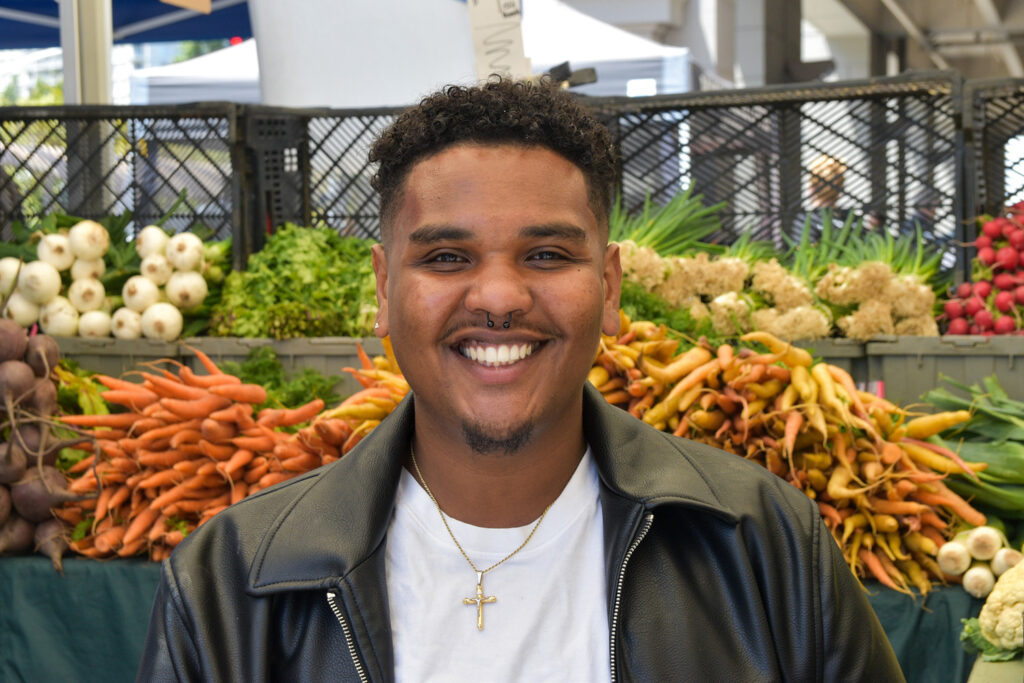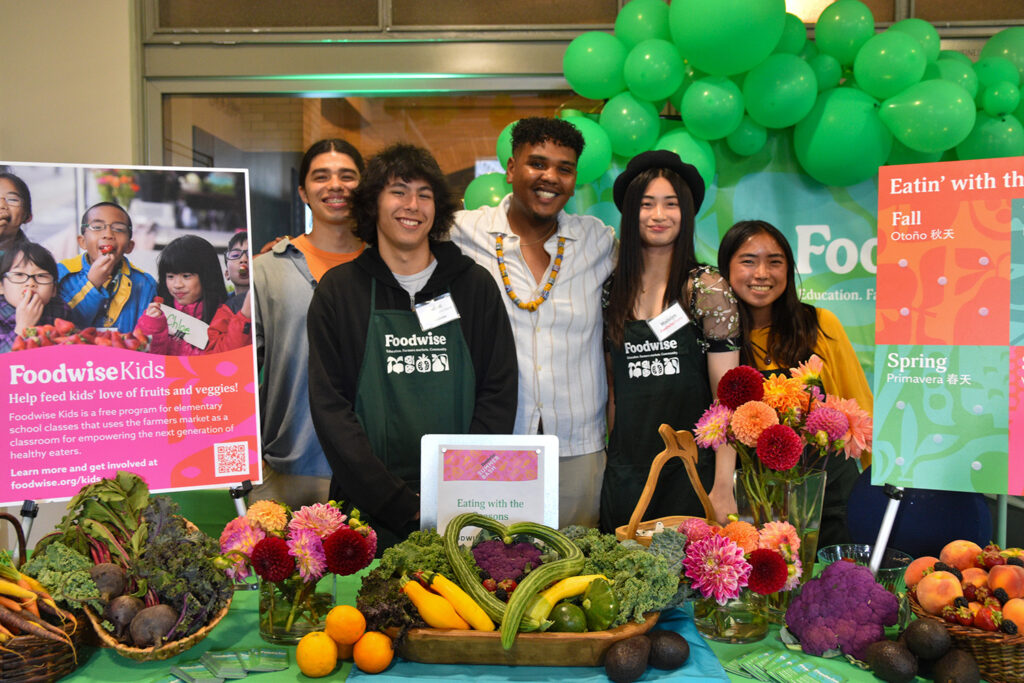Meet Our Team: Marcelo Clark
September 12, 2024

Meet one of the newest members of our team, Marcelo Clark, who joined us in May 2024 as Foodwise’s Youth Education Manager, overseeing our Foodwise Kids and Foodwise Teens programs.
Tell us a bit about you, your background, and what brought you to Foodwise?
My name is Marcelo Clark, and I am the Program Manager at Foodwise. Growing up in a Puerto Rican household, the smell of sofrito in the blender or achiote oil sizzling in the pan always filled my grandmother’s home. From a young age, I watched her prepare dishes like arroz con gandules, pasteles, pernil, bacalaitos, and mofongo—always eager to be the first to sample them. Over time, I became dedicated not only to replicating these recipes but also to understanding their broader cultural and historical connections.
My background is in Sociology and African American Studies, which I studied at UCLA. In my previous work with youth in South Central, Los Angeles, I focused on food pathways, indigenous wisdom, and social justice. One of the things that drew me to Foodwise was the justice framework embedded within the youth curriculum. It resonated with the work I was doing to empower young people to make connections between food systems and larger social issues.
I love exploring the parallels between the natural world and human society—like how trees communicate and build mutual aid networks through mycelium, much like how humans form care networks in moments of crisis. It’s through this lens of connection, care, and community building that I approach my work at Foodwise, and I’m excited to continue this journey of teaching youth how food justice can transform communities.
What does your work at Foodwise look like in action?
My work at Foodwise revolves around engaging youth in meaningful conversations and hands-on activities about food justice, sustainability, and community empowerment. As Program Manager, I design and lead educational programming that connects young people to the larger food system, helping them understand where their food comes from and the social, environmental, and cultural factors that influence it.
A typical day might involve organizing farm visits, facilitating workshops on topics like seed saving or soil health, and teaching students how to grow and prepare their own food. I also spend time connecting the dots between the food systems they see in their everyday lives and larger systemic issues—whether it’s understanding the history behind certain crops, learning about indigenous farming practices, exploring how food insecurity impacts marginalized communities, or turning a simple conversation about soil to make connections to issues of land sovereignty from Standing Rock to Puerto Rico and beyond.
In addition, I work to create a space where youth can see themselves as active participants in building a more just and equitable food system. Through interactive lessons, hands-on gardening, and collaborative discussions, we explore everything from land rights and food sovereignty to how to navigate the farmers market and make informed food choices. The ultimate goal is to equip students with the knowledge, skills, and tools they need to advocate for themselves and their communities.
Working at Foodwise also allows me to bring in my own cultural heritage and lived experiences, such as the lessons I learned growing up in a Puerto Rican household, to inspire youth to explore the rich connections between food, culture, and justice.
What inspires or motivates you about your work?
What truly inspires me about the work I do is the potential to create lasting change by empowering young people. Seeing students make connections between the food they eat, the land it comes from, and the systems that impact their communities is incredibly motivating. It’s not just about growing food—it’s about growing their awareness of social justice, history, and sustainability, all while giving them practical tools to shape their futures.
I’m also deeply motivated by the parallels between natural ecosystems and human networks of care and support. Just like trees rely on mycelium to communicate and share resources, I believe communities thrive when people build connections, mutual aid, and care for one another. This work allows me to guide youth in recognizing these parallels and encourages them to apply these lessons in their own lives.
Growing up in a Puerto Rican household where food was a central expression of love and survival, I learned how recipes and ingredients carried stories of resistance. Sharing those stories and helping youth understand the broader cultural and historical implications of food deeply motivates me.
Ultimately, I’m driven by the belief that young people are the key to building a more equitable and sustainable future, and through food justice work, we’re planting the seeds for that transformation.
What’s something that you wish people understood better about working with youth?
I wish more people understood that youth are not empty vessels that we, as educators, pour information into. They bring their own experiences, knowledge, and unique perspectives into the space, and it’s crucial to honor that. In my work, I use their insights to help navigate lesson plans and discussions, allowing them to guide the direction of the learning process. This approach de-centers the teacher as the sole source of knowledge and positions us all as co-learners, creating a more dynamic and collaborative environment. When working with youth it is important to truly listen to and respect their perspectives. Young people have an incredible capacity for insight, creativity, and critical thinking, but too often, their voices are overlooked or dismissed. When we approach them with curiosity and a genuine desire to learn from them, it creates an empowering environment where they feel valued and capable of leading change.
When we give youth the opportunity to lead, set rules, and shape the conversation, it fosters a sense of ownership and agency over their own learning. It also opens the door for them to express what they’re curious about, making suggestions on what they want to dive deeper into. I believe this kind of participatory approach not only enhances their engagement but also encourages critical thinking and self-advocacy. Youth are not just passive recipients of knowledge—they are active participants, and when we recognize and nurture that, the possibilities for growth and transformation are immense.
Another key aspect is understanding that working with youth requires patience, flexibility, and relationship-building. Youth are navigating complex social, emotional, and developmental changes, and the trust needed to engage them meaningfully doesn’t happen overnight. It’s important to meet them where they are, recognize the challenges they face, and support them in finding their own paths toward growth and self-advocacy.
What do you do to recharge outside of work?
When I need to reset, I also love taking hikes or just spending quiet time outdoors. Being in nature, whether it’s walking through a park or sitting by the ocean, helps me clear my mind and regain perspective. Time spent with family and friends is important to me as well—sharing meals, conversations, and laughter with loved ones helps me feel recharged and supported in my work.
I also enjoy salsa dancing—where there is music you will always find me.
Do you have any favorite farmers market tips you can share?
When it is stone fruit season, always get the pluots. They are so amazing.
What does “food wisdom” mean to you?
Food wisdom, to me, is the deep understanding of the connections between food, culture, land, and community. It’s about recognizing that food is more than just sustenance—it carries history, identity, and the values of those who produce, prepare, and share it. Food wisdom encompasses ancestral knowledge, passed down through generations, that teaches us not only how to grow, harvest, and cook but also how to honor the land and the people who sustain it.
It also means being aware of the systems that control food production and distribution, understanding how these systems impact access and equity, and taking action to build more sustainable and just pathways. Food wisdom is about reclaiming the knowledge that has often been lost or erased, particularly in marginalized communities, and using that knowledge to empower ourselves and others.
On a personal level, food wisdom is the lessons I’ve learned from my Puerto Rican heritage—how ingredients like sofrito, plantains, and beans carry stories of survival and resilience. It’s also about learning from indigenous farming practices and understanding how to work in harmony with the land, respecting its limits and cycles.
Ultimately, food wisdom is about recognizing that food is a powerful tool for connection—between us and the earth, between communities, and between generations. It’s an ongoing journey of learning, sharing, and honoring the knowledge that nourishes both our bodies and our spirits.

Topics: Meet Our Team
